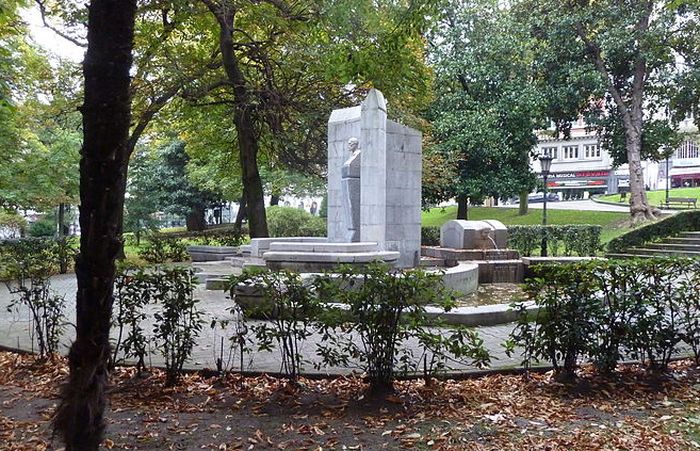But the railway and telegraph furnished incidents of only short duration, and these were soon swallowed up in the sea of solitude which surrounded the meadow “Somonte”; then no living being was to be seen, nor sound from the outside world to be heard.
Morning after morning under the burning rays of the sun and amid the hum of swarming insects the children and the cow watched for the approach of noon to return to the house, and on the long, melancholy afternoons they again awaited the coming of night.
The shadows lengthened, the birds became quiet, and here and there a star appeared in the darkest part of the sky. The souls of the children reflected the serenity of solemn and serious nature, and seated near “La Cordera” they maintained a dreamy silence, broken only now and then by the soft tinkle of the cowbell.
The children, inseparable as the two halves of a green fruit, were united in an affection existing by reason of their scanty knowledge of what was distinct in them and what made them two. This affection was extended to “La Cordera,” the motherly cow, and as far as she was able she returned in her undemonstrative way the love of the children who were charged with guarding her. She showed wonderful patience and toleration when, included in their imaginative games, she was subjected to no very gentle usage, and gave evidence at all limes of quiet and thoughtful consideration.
Only recently had Anton de Chinta, the children`s father, acquired possession of the meadow “Somonte” and “La Cordera” enjoyed the privilege of such succulent pasture. She had previously been compelled to wander along the public roads and obtain her food from the scant herbage which grew along their borders.
In those times of poverty, Pinin and Rosa sought out for her the most favorable spots, and in many ways guarded her against the indignities to which animals are exposed who have to look for fodder on public lands, and in the lean and hungry days of the stable when hay was scarce and turnips not to be had the cow owed to the children a thousand little attentions which served to make life more bearable.
Delight and stumbling
Then, too, during those heroic times between the birth and weaning of her calves, when the inevitable question arose as to how much milk the Chintas should have and what was necessary for her own offspring, it was at such times that Pinin and Rosa were always found taking sides with “La Cordera.” They would secretly let loose the young calf, which, wild with delight and stumbling over everything in its path, would rush to seek food and shelter underneath the ample body of its mother, while the latter would turn her head toward the children with a look of tenderness and gratitude.
Such ties could never be broken and such memories never be effaced.
Anton de Chinta had come to the conclusion that he was born under an unlucky star, and that his golden dreams of gradually increasing his stable were not to be fulfilled; for, having procured the one cow by means of a thousand economies and privations, he not only failed to acquire a second, but finally found himself behind in his rent. He saw in “La Cordera” his only available asset, and realized that she must be sold in spite of the fact that she was considered one of the family, and that his wife with her last breath had referred to the cow as their future mainstay.
As the mother lay upon her deathbed, in a room separated from the stable only by a partition of interwoven cornstalks, she turned her weary eyes toward “La Cordera” as if to silently entreat her to be a second mother to the children, and to supply that affection which the father could not understand.
Read More about Zoe and Theodora part 43








